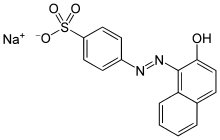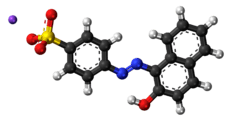Acid orange 7
Acid orange 7, also known as 2-naphthol orange and Orange II, is an azo dye. It is used for dyeing wool. It is produced by azo coupling of β-naphthol and diazonium derivative of sulfanilic acid.[1][2]
 | |
 | |
| Names | |
|---|---|
| IUPAC name
sodium 4-[(2E)-2-(2-oxonaphthalen-1-ylidene)hydrazinyl]benzenesulfonate | |
| Other names
2-naphthol orange, Orange II, CI 15510, D&C Orange 4, COLIPA C015 | |
| Identifiers | |
3D model (JSmol) |
|
| ChemSpider | |
| ECHA InfoCard | 100.010.182 |
PubChem CID |
|
| UNII | |
CompTox Dashboard (EPA) |
|
| |
| |
| Properties | |
| C16H11N2NaO4S (sodium salt) | |
| Molar mass | 350.32 g/mol |
Except where otherwise noted, data are given for materials in their standard state (at 25 °C [77 °F], 100 kPa). | |
| Infobox references | |
References
- Klaus Hunger; Peter Mischke; Wolfgang Rieper; Roderich Raue; Klaus Kunde; Aloys Engel (2005). "Azo Dyes". Ullmann’s Encyclopedia of Industrial Chemistry. Weinheim: Wiley-VCH. doi:10.1002/14356007.a03_245..
- www.chemicalland21.com
This article is issued from Wikipedia. The text is licensed under Creative Commons - Attribution - Sharealike. Additional terms may apply for the media files.